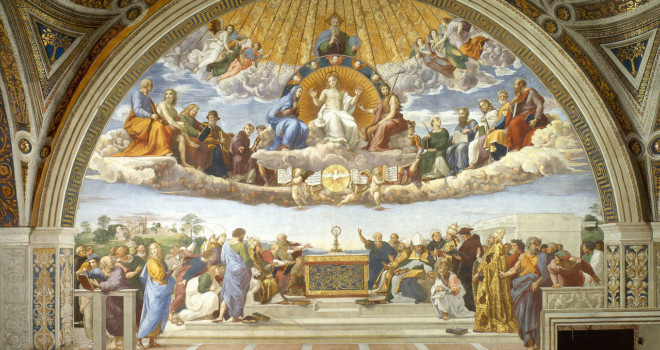Our Church has given us so many tools on this journey to Heaven, we’re blessed with an overabundance of riches. So much so, that I think we often forget the riches we have at our disposal. One of these tools is indulgences. So, in an effort to remind us all of the treasures of our Church, enjoy this Indulgence Primer.
What Is An Indulgence?
“1471 An indulgence is a remission before God of the temporal punishment due to sins whose guilt has already been forgiven, which the faithful Christian who is duly disposed gains under certain prescribed conditions through the action of the Church which, as the minister of redemption, dispenses and applies with authority the treasury of the satisfactions of Christ and the saints. An indulgence is partial or plenary according as it removes either part or all of the temporal punishment due to sin. The faithful can gain indulgences for themselves or apply them to the dead.”
Catechism of the Catholic Church
Why Do We Need Indulgences?
“1472 To understand this doctrine and practice of the Church, it is necessary to understand that sin has a double consequence. Grave sin deprives us of communion with God and therefore makes us incapable of eternal life, the privation of which is called the “eternal punishment” of sin. On the other hand every sin, even venial, entails an unhealthy attachment to creatures, which must be purified either here on earth, or after death in the state called Purgatory. This purification frees one from what is called the “temporal punishment” of sin. These two punishments must not be conceived of as a kind of vengeance inflicted by God from without, but as following from the very nature of sin. A conversion which proceeds from a fervent charity can attain the complete purification of the sinner in such a way that no punishment would remain.
1473 The forgiveness of sin and restoration of communion with God entail the remission of the eternal punishment of sin, but temporal punishment of sin remains. While patiently bearing sufferings and trials of all kinds and, when the day comes, serenely facing death, the Christian must strive to accept this temporal punishment of sin as a grace. He should strive by works of mercy and charity, as well as by prayer and the various practices of penance, to put off completely the “old man” and to put on the ‘new man.’”
Catechism of the Catholic Church
WHAT DOES THIS MEAN?
When we sin, there are two consequences of our sin: the spiritual and temporal. While Confession cleanses us of the spiritual part of our sin, we still need to deal with the temporal consequences of it.
For example, if I break my sister’s crystal vase, I must apologize to her for having done so. That’s like the spiritual aspect of my sin, which is taken care of in Confession. After I do that and am forgiven, however, there remains the fact that my sister’s vase is broken. I need to fix that. That’s the temporal consequence of my sin. I have to remedy that situation by either giving her money to buy another vase or by buying her the vase myself.
Each one of our sins has both dimensions. When we steal something, we need to return it. When we gossip or preform the sin of detraction, we need to remedy the damage we’ve done to that person’s reputation. And so on. For some sins, fixing the damage we’ve done isn’t so easy–murder, abortion–or sometimes we just never thought to do it (like with all that gossiping some of us might have done in high school… ahem!). That’s where Purgatory comes in. AND Indulgences.
*Note at the end of #1472, “A conversion which proceeds from a fervent charity can attain the complete purification of the sinner in such a way that no punishment would remain.” So, a perfect confession can cleanse both parts of sin.
WHAT IS PERFECT CONTRITION?
Perfect Contrition comes from our love for God above all else. We confess and are sorry for our sins purely because they offend God, and not for any other reason.
An Imperfect Contrition, which is also a gift of the Holy Spirit, comes more from a fear of sin’s consequences than love for God.
While we all might be thinking, “Don’t I always do a perfect contrition?!” we’re all much more complicated creatures than we think, and while we may think our motives are pure, there often remain specks of impurities that only God can see. At the end of the day, it’s better to be safe than sorry, and this is why Indulgences are such a gift. We can’t presume we’re making perfect contritions.
How Can I Get An Indulgence?
There are two kinds of Indulgences: Plenary and Partial. A Partial Indulgence remits part of the temporal punishment due; a Plenary Indulgence remits all of it.
REQUIREMENTS
In order to obtain an Indulgence, we MUST do the following things:
- DESIRE to obtain the Indulgence: I usually just say before I begin, “Jesus, I’m doing this to obtain a Plenary Indulgence.” You can also pray this morning prayer and it should cover you for the day:
O my God, in union with the Immaculate Heart of Mary (kiss your scapular), I offer Thee the Precious Blood of Jesus from all the altars throughout the world, joining with it the offering of my every thought, word, and action of this day. O my Jesus, I desire today to gain every indulgence and merit I can and I offer them, together with myself, to Mary Immaculate, that she may best apply them in the interests of Thy Most Sacred Heart. Precious Blood of Jesus, save us! Sacred Heart of Jesus, have mercy on us! Amen.
- CONFESS. You have to go to confession “several” days before or after you perform the indulgenced act. Traditionally, this was 8-10 days, although in the Great Jubilee Year of 2000, the amount of days was increased to 20, and that decision remains intact. Note: You must be in a state of grace to obtain a plenary indulgence. This means, at the time you perform the indulgenced act, you must be free from all attachment to sin. You can’t be mad at people, hold grudges, hate anyone, etc. Confess it all and let it go!
- COMMUNION. Receive Holy Communion. During Mass is preferable, although otherwise is allowed. The day of the indulgenced act is also preferred, but not required.
- PAPAL INTENTIONS. You must pray for the intentions of the Holy Father. This is not praying for the Pope, himself, but for his intentions, which he releases each month. You don’t need to know what they are–God knows. An Our Father, Hail Mary, and Glory Be suffice.
SMALL PRINT
- We can only obtain one plenary indulgence a day. EXCEPT on the day we die, when we can get two.
- We can only offer indulgences for our own sins or for the Holy Souls in Purgatory. (See below about the Heroic Act of Charity.)
- If you strive to gain a Plenary Indulgence, but fail to fulfill all the requirements, the indulgence will be only partial.
- For the sake of those legitimately impeded, confessors can commute both the work prescribed and the conditions required (except detachment from even venial sin).
INDULGENCED ACTS
There are many acts to which our Holy Mother Church has attached indulgences. Here are a few easy ones. Feel free to add more in the com box!
- ADORATION. Spend at least 30 minutes in adoration of the Blessed Sacrament. It needn’t be exposed, as it is in a Monstrance. Jesus can be residing in the Tabernacle as you spend time with Him. But exposition is ok, too.
- SCRIPTURE. Spend at least 30 minutes reading Sacred Scripture, as spiritual reading, with the veneration due to the Word of God.
- STATIONS. Do the Stations of the Cross. This requires that you walk from Station to Station in Church. No specific prayers are required, but devout meditation on the Passion and Death of Our Lord is required.
- ROSARY. Pray the Rosary (at least 5 decades), with devout meditation on the Mysteries, in addition to the vocal recitation. There are conditions to this: you must be in a church or chapel, or else praying with your family, a religious community or a pious association (like the Rosary Confraternity). The five decades must be prayed without interruption; meditation on the mysteries must be added to the vocal recitation; and in public recitation the mysteries must be announced according to approved local custom.
Other Indulgenced acts include:
- Performing spiritual exercises of at least three days.
- Those who make their first Communion or who assist at another’s first Communion.
- Celebrating or assisting at a priest’s first solemn Mass, or at his 25th, 50th or 60th anniversary Mass.
- Visiting a church or altar on the day of its dedication and praying an Our Father and a Creed.
- Renewing your baptismal promises during the Easter Vigil or on the anniversary of our baptism.
- Devoutly receiving a papal blessing in person or through live transmission by radio, television or Internet. (Thanks, EWTN!)
- Each Friday during Lent, we can obtain a plenary indulgence by piously reciting the prayer “Look down Upon Me, Good and Gentle Jesus” after Communion, before an image of Christ crucified.
An important note: “Apart from the plenary indulgences, Catholics do well to be aware that most of their habitual prayers, sacrifices and habitual service to others, from the sign of the cross to the Hail Mary, are endowed with partial indulgences which increase their weight before God and give them an opportunity to exercise selfless charity in offering their prayers in benefit of the souls in purgatory.”*
The norms given here are from the official Enchiridion of Indulgences (1968) and the Apostolic Constitution The Doctrine of Indulgences (1967).
The Heroic Act of Charity
When I was in High School, I came across The Heroic Act of Charity in an old prayer book. I thought it sounded brave and honorable, so I prayed it. It goes like this:
O my God, for Thy greater glory, and to imitate as closely as possible the generous Heart of Jesus, my Redeemer, and also to testify my devotion to the Blessed Virgin, my Mother, who is also the Mother of the Souls in Purgatory, I place in her hands all my satisfactory works, as well as the fruit of all those which may be offered for my intention after my death, that she may apply them to the Souls in Purgatory according to her wisdom and good pleasure. Amen.
By reciting this prayer, we tell God that we give Him and His Blessed Mother ALL OF OUR SATISFACTORY WORKS AND THEIR FRUIT. Basically everything good we do for God, we give it to Him and Mary to apply to the Holy Souls and not use it for ourselves.
A few times, after praying this prayer, I’d remember and have a tinge of regret–just a tinge! “WHAT ABOUT ME?!” I’d narcissistically think. I mean, think about it! This prayer is like saying, “Lord, I’m going to give you and your Mother all of the paychecks I earn during my life, plus all the Lottery winnings and presents I’ve received over the years. Give them to whoever you want. I will save nothing for myself.”
In a world of greedy people, this act would definitely be unwise because we’d be left with nothing!
But God, His Blessed Mother, and the Holy Souls are not greedy! They are loving and grateful! And they NEED OUR HELP! So when we give them everything we have to give them, they give it back to us in spades. Praying this prayer is like investing in Heavenly Stock! Not only do we help others by donating to their causes, but we gain interest on our investment! Now this is the kind of investment I’m willing to make!
So I encourage you to pray this prayer. I hope, when I stand before God, with empty pockets and nothing to offer Him, that His Blessed Mother and all those Holy Souls will stand beside me and plead my case.
Now go get some indulgences!
REFERENCES
- Vatican, THE GIFT OF THE INDULGENCE
- NC Register, “How You Can Get Plenary Indulgences This Summer”
- EWTN, “Indulgences – General Conditions”
*Image: Disputation of Holy Sacrament, by Raphael.
Editor’s note: This article originally appeared on SpiritualDirection.com and is reprinted here with kind permission.















